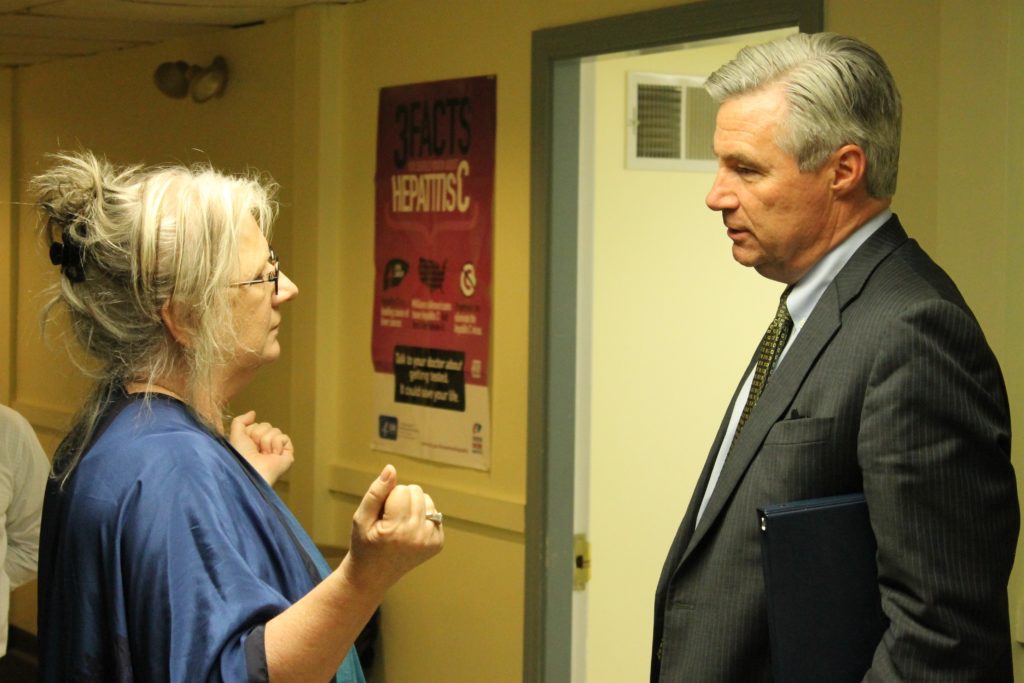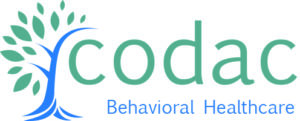At CODAC Behavioral Healthcare, Sen. Sheldon Whitehouse Visits the Front Lines in the Fight Against the Opioid Epidemic

Linda Hurley, President/CEO of CODAC, welcomes Sen. Sheldon Whitehouse to the organization’s Providence facility and begins a guided tour.Linda Hurley, President/CEO of CODAC, welcomes Sen. Sheldon Whitehouse to the organization’s Providence facility and begins a guided tour.
PROVIDENCE, R.I. (June 8, 2018) — While Rhode Island has made significant headway in addressing the opioid crisis, health officials throughout the state say more work is needed after a spike in overdoses occurred in May. In an effort to ensure healthcare providers have the resources they need to curb the crisis, U.S. Senator Sheldon Whitehouse visited a CODAC Behavioral Healthcare facility at 349 Huntington Avenue on Friday, June 8, to meet the staff members that are working relentlessly to help Rhode Island families overcome addiction.
“In the midst of the overdose epidemic, we have reached capacity in this building. We service over 1,000 Providence residents for Opioid Use Disorder who are coming here because we also evaluate and address their psychiatric and infectious disease conditions,” said Linda Hurley, President/CEO of CODAC Behavioral Healthcare.
Guided through the same halls a patient would take, Sen. Whitehouse listened to staff from CODAC who detailed the organization’s work and the need for additional space as overdoses continue to escalate.
“Many of the patients who come through CODAC’s doors are facing the most difficult time in their lives, and they are met with lifesaving compassion and care from the staff here,” Sen. Whitehouse said after the tour.
One of the healthcare professionals Sen. Whitehouse met with was Dr. Lynn E. Taylor, the Director of HIV and Viral Hepatitis Services at CODAC. She expressed concern about the position hospitals have taken towards providing holistic medical services for patients with Medicare.

Dr. Lynn E. Taylor explains concerning changes that are occurring at RI hospitals.
“This is the only non-profit program of its type in the state. To my knowledge, it is the only program where the physicians are board certified in addiction medicine. It is the most difficult board to pass according to surgeons and other physicians I’ve spoken to,” Dr. Taylor said. She added that CODAC treats patients regardless of their insurance status.
Dr. Taylor, a nationally recognized leader in the treatment of HCV and a former clinician researcher at Brown University, said she felt she could make a bigger impact in the community by working with Hurley. “CODAC is a one-stop shop for the treatment of addiction, infectious diseases, and psychiatric and mental healthcare,” Dr. Taylor said.
Following his conversation with the internationally renowned researcher, Sen. Whitehouse reiterated his commitment to help Rhode Island families who are battling addiction and infectious illnesses — two health issues that are commonly intertwined. “The opioid addiction crisis has hit close to home for far too many Rhode Island families. I fought to pass my bipartisan, comprehensive addiction legislation and for funding to go along with it so those on the front lines would have the resources to help more people onto a path to recovery and to turn this crisis around,” Sen. Whitehouse said.
A champion in the fight against the opioid epidemic, Sen. Whitehouse has been part of a bipartisan group of senators who are introducing legislation to strengthen the Comprehensive Addiction and Recovery Act (CARA), a bill the Senator co-authored and successfully passed in the Senate in 2016. If Congress passes the reformed bill, it would increase funding authorization by $6 billion to help stem the tide against the opioid crisis.
Referred to as CARA 2.0, the bill would help patients receive access to recovery support services and increase the availability of life saving treatments that will directly benefit the recovery community in the Ocean State. Statistics suggest those funds will be needed to change the trajectory of overdoses across Rhode Island.
The most recent statistics from Prevent Overdose RI show that there have been an average of 4.2 overdose emergency room visits per day since February 2016. However, many of the patients who leave Rhode Island hospitals will not receive the ‘whole person’ care they would receive at CODAC, according to Dr. Taylor.
While the location at 349 Huntington Avenue has served its purpose and will continue to do so for the foreseeable future, Dr. Taylor said it would be a bonus to move to a location “where patients could feel proud of visiting.”
About CODAC Behavioral Healthcare
Founded in 1971, CODAC Behavioral Healthcare is Rhode Island’s oldest and largest provider of outpatient services for opioid use disorder, other substance use disorders, and concurrent behavioral health challenges. With eight locations across Rhode Island, CODAC is uniquely positioned to provide services when and where they are needed. For more information about CODAC, visit: http://www.codacinc.org
###

